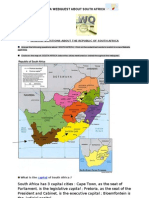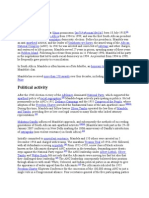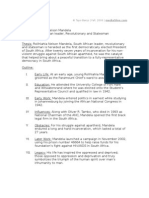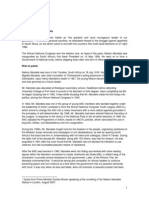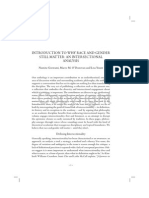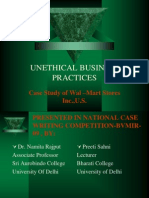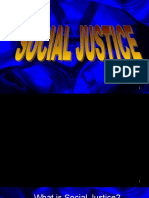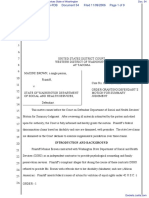Discurso de Nelson Mandela
Discurso de Nelson Mandela
Uploaded by
RaquelMaiaCopyright:
Available Formats
Discurso de Nelson Mandela
Discurso de Nelson Mandela
Uploaded by
RaquelMaiaOriginal Description:
Copyright
Available Formats
Share this document
Did you find this document useful?
Is this content inappropriate?
Copyright:
Available Formats
Discurso de Nelson Mandela
Discurso de Nelson Mandela
Uploaded by
RaquelMaiaCopyright:
Available Formats
Milestone Documents in World History Volume 4 MB
Nelson Mandela
1796
12/29/09
4:48 PM
Page 1796
(AP/Wide World Photos)
Milestone Documents in World History
12/29/09
4:48 PM
Page 1797
Nelson Mandelas Inaugural Address
1994
Milestone Documents in World History Volume 4 MB
Never again shall it be that this beautiful land will again experience
the oppression of one by another.
Overview
On May 10, 1994, Nelson Mandela was
sworn in as president of the Republic of
South Africa. The moment was a triumphal
celebration of the transition from apartheid
rule to a democratic South Africa and from
white minority rule to black majority rule.
Mandela, who had led the resistance to
white rule and who had been imprisoned for that resistance
from 1962 to 1990, became the first black man to become
South Africas head of state. His inaugural address was a
conciliatory, forward-looking celebration of the changes
that had taken place in South Africa.
In the 1980s, when white minority rule was still strong
and the apartheid policy still tried to separate whites and
blacks, few could have predicted that within a decade
apartheid legislation would be repealed and all citizens
would be able to vote freely for a new head of state. At that
time, most commentators predicted that South Africa
would descend into a bloody racial civil war. But that racial
war did not come to pass. Instead, after a gradual dismantling of the apartheid system, Mandela became president
through a relatively peaceful democratic process. Many
spoke of this as a miracle. The new leader was a man who
had endured imprisonment for more than a quarter of a
century and had emerged from that imprisonment without
bitterness toward those who had imprisoned him. His reconciliatory attitude and remarkably open and charismatic
personality gave him a saintly aura, and his inauguration as
president of the country that only a few years earlier had
been despised for its apartheid policies was celebrated
around the world. It was on the occasion of his inauguration that Mandela delivered this speech.
Context
South Africa had a long history of racial segregation
before the National Party governments adoption of a policy of apartheid in 1948. Black Africans had always formed
a majority of the population of the area that in 1910
became the Union of South Africa, a nation that comprised
Nelson Mandelas Inaugural Address
Cape Colony, Natal, Transvaal, and the Orange Free State,
under primarily British dominion. The borders of the state
formed in 1910 are virtually coterminous with those of the
modern state. But the white population had conquered the
indigenous peoples and dispossessed them of their land,
and though whites wanted to use black labor, they kept
blacks in subordinate positions.
Black challenges to colonialism had been in vain, and it
was only gradually that new forms of resistance emerged.
In the cities, members of the black African elite began to
organize politically and to campaign for equal rights. To
that end, the South African Native National Congress was
formed in 1912, and in 1923 it changed its name to the
African National Congress (ANC). The ANC went through
a period of decline in the 1920s and 1930s, but under the
influence of its Youth League, of which Mandela was a
member, it revived in the 1940s.
The Afrikaner National Party came to power in 1948 on
a program of rigid and more extensive racial segregation than
before, known as apartheid. (Afrikaner refers to an ethnic
group descended from seventeenth-century settlers from
northwestern Europe.) In response, the ANC launched a
new campaign involving civil disobedience and strike action.
In 1952, for example, the ANC joined with the South African
Indian Congress to embark on the Campaign of Defiance
against Unjust Laws, a passive resistance protest launched
on June 26 in which more than eight thousand people,
including some whites, defied key racial laws. Many were
imprisoned, including Nelson Mandela. The campaign lost
steam after the government banned all meetings of more
than ten Africans. Further, the Public Safety Act suppressed
future campaigns by allowing the government to declare a
state of emergency in response to threats to the public peace,
and the Criminal Law Amendment Act imposed severe
penalties, including fines, imprisonment, and whipping, for
publically protesting a law. During the campaign, the ANC
attracted more members, growing to more than one hundred
thousand, but the organizations leaders were unsure how to
maintain the momentum of protest action.
One step taken to continue the momentum was the
drafting of the Freedom Charter of South Africa, which
became a key document in the struggle against apartheid.
It was drafted by a small committee, on the basis of a large
1797
Milestone Documents in World History Volume 4 MB
12/29/09
Time Line
1912
January
The South African
Native National
Congress is
founded.
1923
The South
African Native
National Congress changes
its name to the
African National
Congress.
1948
May
The white
National Party
comes to power
and begins to
introduce
apartheid.
1949
December 17
The ANC conference adopts
a program calling for direct
action against
apartheid.
1952
June 26
The Campaign
of Defiance
against Unjust
Laws begins.
1955
June 2526
The Congress of
the People convenes and
adopts the Freedom Charter.
1990
1798
February 2
President F. W. de
Klerk announces
the unbanning of
the ANC and other
organizations and
the impending
unconditional
release of Nelson
Mandela.
4:48 PM
Page 1798
number of submissions, and during the Congress of the
People, held at Kliptown outside Johannesburg on June
2526, 1955, the charter was adopted. It became a document of immense symbolic importance, for it embodied a
vision of a future democratic South Africa that was not
organized around distinctions of race. It would later
become significant in the 1980s, when charterists, or
those whose philosophy was based on the charter, dominated resistance to apartheid; after apartheid had come to an
end, the nations new constitution, adopted in 1996, was in
part based on ideas in the Freedom Charter.
The apartheid regime retaliated against this and other
instances of activism with more brutally repressive policies,
and in March 1960, in the township of Sharpeville, south
of Johannesburg, the police shot dead sixty-nine black
Africans who were engaged in peaceful protest against the
law that required them to carry identity books, which prevented them from moving around the country freely.
After that, Mandela and others in the ANC decided that
they had to take up arms to challenge the state. Mandela
himself became the commander in chief of a new organization formed to lead the armed struggle. Known as
Umkhonto we Sizwe (MK), meaning Spear of the Nation,
this group became the armed wing of the ANC. Within a
few years, however, the leadership of MK had been arrested, and Mandela and others were imprisoned on Robben
Island in Table Bay, off the coast of Cape Town. After Mandela was released on February 11, 1990, South Africa went
through a turbulent period in which there was considerable
political violence, but eventually the government of President F. W. de Klerk agreed to meet in a negotiating forum
in Cape Town with leaders of the ANC to hammer out a
settlement. The settlement took the form of an interim
constitution and provision for the election of a new parliament, comprising the Constitutional Assembly and the
National Council of Provinces. The democratically elected
parliament was to be responsible for drawing up a final
constitution. The interim constitution specified that the
head of state was to be elected by the parliament for a fiveyear term. In May 1994, Mandela became that president.
About the Author
Nelson Rolihlahla (meaning troublemaker in the
Xhosa language) Mandela was born in 1918 in the rural
Transkei in what is now the Eastern Cape province of
South Africa. He attended a leading missionary school in
that region and then the University College of Fort Hare
before he moved to Johannesburg, the largest city in South
Africa, where he became active in the ANC in the early
1940s. In the 1950s, based in Johannesburg, he was one of
the leading figures in the ANCs resistance to the apartheid
state. The ANC was banned in 1960, and the following
year he and others formed MK to challenge the state by
violent means, first sabotage and later guerrilla war.
As commander in chief of MK, Mandela left the country in 1962 to organize military training for guerrillas from
Milestone Documents in World History
Milestone Documents in World History Volume 4 MB
12/29/09
4:48 PM
Time Line
1990
February 11
Mandela walks out
of Victor Verster
Prison outside Cape
Town and is driven
to Cape Town,
where he addresses
the crowd gathered
on the Grand
Parade in the center of the city.
May
The ANC and the
government hold
their first formal
bilateral meeting at
Groote Schuur, an
official government
residence in Cape
Town.
1991
December
The Convention
for a Democratic South Africa
meets at the
World Trade
Center in Kempton Park to
begin the drafting of a new
constitution.
1992
September
Mandela and
De Klerk sign
the Record of
Understanding,
which paves the
way for the
resumption of
constitutional
negotiations
after the breakdown of the
Convention for a
Democratic
South Africa.
1993
November 18
The Multiparty
Negotiating
Forum completes the drafting of the new
interim constitution for a democratic South
Africa.
I have fought against white domination, and I have
fought against black domination. I have cherished the
ideal of a democratic and free society in which all persons live together in harmony and with equal opportunities. It is an ideal which I hope to live for and to
achieve. But if needs be, it is an ideal for which I am
prepared to die. (Karis and Carter, p. 796)
In 1982 he was moved, in part because of his growing
international fame as a political prisoner, from Robben
Island to Pollsmoor Prison on the mainland. It was there, a
few years later, that he began discussions with government
ministers about the possibility of a negotiated end to the
conflict in the country.
By the late 1980s Mandela was the worlds most famous
prisoner and an icon of resistance to apartheid. The
apartheid government knew that there would be an outcry
if he were to die in prison, and its officials came to see him
as a man with whom they could arrange a negotiated settlement, for unlike most of his close colleagues in the ANC,
he was not a member of the Communist Party. All who met
him recognized him as a potential future leader of the
country. He was therefore moved to a house on the grounds
of another prison, Victor Verster, where he was able to
receive guests and conduct business.
By the time he became president in late 1989, F. W. de
Klerk, the head of the National Party, had realized that
apartheid had to go and that the enormous pressure to
release Mandela could be resisted no longer. No one knew
what Mandelas release would lead to, but de Klerk was
prepared to take the risk. Lacking bitterness, Mandela was
able to engage with his former enemies and work for a successful transition to a new society. He traveled extensively
after his release, was elected president of the ANC at the
first congress after it was unbanned, and took a leading role
in the subsequent negotiations. In December 1993 he and
De Klerk were jointly awarded the Nobel Peace Prize in
Oslo, Norway, for their efforts to bring peace to South
Africa. Mandela then campaigned for the ANC in the first
democratic election, after which he was elected the first
president of the democratic South Africa. Little more than
four years had passed since he was Prisoner 466/64, the
number he received on arrival on Robben Island and which
he retained until his release from Victor Verster.
Mandela made it clear that he would serve only one
term as president. He hoped his example would be followed
by other leaders on a continent where most remained in
power for very long periods of time. In retirement, Mandela
remained active on both the local and the world stages. He
set up three foundations bearing his name, to do mostly
Nelson Mandelas Inaugural Address
Milestone Documents
South Africa in other African countries. On his return to
South Africa, he was arrested and jailed. Then, on June 12,
1964, he and his colleagues were given a life sentence for
their involvement with MK. Mandelas statement in court
before he was sentenced was widely quoted as a classic
explanation of why he and others had chosen to adopt the
armed struggle in resisting apartheid. He ended by saying,
Page 1799
1799
Milestone Documents in World History Volume 4 MB
12/29/09
Time Line
1800
1993
December
The draft constitution is approved by
the South African
Parliament.
1994
April 27
The first democratic general
election is held,
relatively peacefully. Mandela
casts his vote at
Ohlange High
School, outside
Durban, in honor
of John Dube, a
cofounder of the
ANC, who is
buried in a nearby
cemetery.
May 2
The results of the
election are
declared, and the
ANC celebrates its
victory.
May 9
The new parliament
elects Mandela
president.
May 10
Mandela gives his
inaugural address
to a crowd
gathered in Pretoria
after having
delivered a similar
address in Cape
Town the
previous day.
1997
Mandela hands
over the presidency the ANC
to Thabo Mbeki.
1999
Mandelas fiveyear term as
president of
South Africa
comes to an
end; Mbeki succeeds him.
4:48 PM
Page 1800
educational and charitable work: the Nelson Mandela
Foundation, the Nelson Mandela Childrens Fund, and the
Mandela-Rhodes Foundation. In the 2009 election campaign, a frail Mandela appeared in support of the new ANC
leader, Jacob Zuma.
Ten years after Mandela had left office, little of the
dream for a new South Africa contained in his inauguration
address had been realized. South Africa remained a democracy, but there was little of the optimism and hope and idealism that Mandela had spoken of in his inaugural address
fifteen years earlier.
Explanation and Analysis of the Document
Mandelas inaugural address was highly symbolic. The
very fact that he, a black man and former prisoner of the
apartheid regime, was delivering it before a large crowd in
which there were representatives of most of the countries in
the world, demonstrated that South Africa had rejoined the
world community after a long period of isolation under
apartheid. Mandela speaks of humanity having taken
[South Africa] back into its bosom and remarks, We, who
were outlaws not so long ago, have today been given the rare
privilege to be host to the nations of the world on our own
soil. Mandela was acknowledging that apartheid South
Africa had long been isolated and treated as a pariah nation
because of its racial policies, and he was celebrating that
now South Africa had become a model for others to follow,
a land in which it seemed that racial reconciliation had triumphed. And so Mandela thanks the guests from all over
the world for attending and hopes that they would continue to stand by us as we tackle the challenges of building
peace, prosperity, non-sexism, non-racialism and democracy. He was very conscious of the fact that South Africa was
emerging from decades of conflict, isolation, and economic
decline, and he knew that it would need much help from
others if it was to overcome the challenges it faced.
In the first sentence of his address Mandela speaks of
newborn liberty, referring to the fact that South Africa was
experiencing a new dawn of democracy after the long night
of apartheid. His references to an extraordinary human
disaster that lasted too long and to South Africa tearing
itself apart in a terrible conflict point to apartheid and to
the struggle against it, in which many had died and millions
had suffered. For although far fewer people died in the
South African conflict between 1948 and 1994 than in
other conflicts on the African continent, such as in neighboring Zimbabwe in the 1970s or in the war for independence in Algeria in the 1950s and early 1960s, the policy of
apartheid had trampled on the dignity of black people.
In speaking of apartheid in this way, Mandela addressed
not only the black majority who had suffered under it but
also those whites who had supported apartheid until
recently and who had served the apartheid state. Of course,
he was speaking as well to the whites who had opposed
apartheid. Mandelas general attitude of reconciliation
ensured that he did not arouse antagonism among those
Milestone Documents in World History
Milestone Documents in World History Volume 4 MB
12/29/09
4:48 PM
Page 1801
Milestone Documents
A crowd gathers at the township of Sharpeville, south of Johannesburg, South Africa, on March 21, 1960, a few
hours before white police opened fire on marchers. (AP/Wide World Photos)
who had supported the old apartheid order. Although Mandela continued to fear a far-right backlash against his new
government from Afrikaners who were not reconciled to
the new order, no serious resistance occurred. This was in
large part due to Mandelas personality and policies of reconciliation. Mandela here speaks inclusively. All South
Africans, he says, were attached to the soil of their particularly beautiful country, and he specifies some of these
beauties in his references to the famous jacaranda trees of
Pretoria and the mimosa trees of the bushveld. His speech
anticipated the reconciliatory spirit of his presidency, in
which he would reach out to his opponents and do all he
could to enhance nation building.
In his address, he singles out the masses for their role
in bringing South Africa to the present moment. Most historians would agree that apartheid had been brought down
by internal resistance in the 1980s rather than by the
armed struggle waged mainly from outside or by the sanctions that other countries had imposed on South Africa. On
the other hand, the masses had played very little part in the
negotiated settlement, which had been reached by elites of
the old apartheid order and the ANC leadership.
Nelson Mandelas Inaugural Address
Mandela also singles out his second deputy president, F.
W. de Klerk, who had been responsible for Mandelas release.
Mandela had become disillusioned with De Klerk, whom he
blamed for not acting to end the political violence that had
plagued the country during the years of transition and in the
campaign leading up to the general election. As leader of the
National Party, De Klerk had been Mandelas chief opponent,
but Mandela chose to credit De Klerk with what he had done
to help bring about the new order and to accept him as a colleague in the new government of national unity.
Mandela also pays tribute to the countrys security
forces for helping secure the election and for defending
against the blood-thirsty forces which still refuse to see
the light, a reference to those far-right whites who rejected the transition and from whom Mandela continued to
fear violence might come. He reminds his listeners that the
country had taken its last steps to freedom in conditions
of relative peace. He himself had long talked of walking to
freedom, and his autobiography, published later that year,
was titled Long Walk to Freedom.
In the remainder of the address, Mandela looks forward
to the future. He talks of healing wounds, bridging the
1801
Milestone Documents in World History Volume 4 MB
12/29/09
4:48 PM
Page 1802
Essential Quotes
We dedicate this day to all the heroes and heroines in this country and the
rest of the world who sacrificed in many ways and surrendered their lives
so that we could be free. Their dreams have become reality. Freedom is
their reward.
(Paragraphs 2122)
We know it well that none of us acting alone can achieve success. We
must therefore act together as a united people, for national reconciliation,
for nation building, for the birth of a new world.
(Paragraphs 2526)
Let there be justice for all. Let there be peace for all. Let there be work,
bread, water and salt for all. Let each know that for each the body, the
mind and the soul have been freed to fulfill themselves.
(Paragraphs 2730)
Never, never and never again shall it be that this beautiful land will again
experience the oppression of one by another and suffer the indignity of
being the skunk of the world. Let freedom reign.
(Paragraphs 3132)
chasms of racial division, and building. He pledges that the
new government will continue the process of emancipation
by liberating the people from poverty, deprivation, and discrimination and by the construction of a complete, just
and lasting peace. In calling for unity among blacks and
whites in South Africa, he refers to the nation by the common image of a rainbow, where all colors merge to form a
thing of beautyperhaps an allusion to the Rainbow
Coalition formed by the civil rights activist and Baptist
minister Jesse Jackson in the United States. As a gesture of
good faith, Mandela indicates that the new government
will address the issue of granting amnesty to people in
prison, probably referring both to those who were imprisoned for activism and protest and more important, to those
who perhaps took part in human rights violation against
blacks but had come forward to confess.
The final paragraphs of the address consist of a series of
short, inspirational sentences. Mandela acknowledges that
there is no easy road to freedom, but he expresses hope
that if South Africans act as a united people, there can be
1802
justice and peace, as well as work, bread, water and salt
for all. He looks forward to a future without oppression
and indignity, where freedom reigns and where the sun will
never set on so glorious a human achievement.
Audience
Mandelas May 10 inaugural speech was directed at
both a South African and an international audience. In
what was in a sense a state-of-the-nation address, Mandela
wanted both audiences to recognize the importance of the
turning point that his address represented in the countrys
history. He wanted the international community to see the
new South Africa as a model state, which could teach others how to reconcile and overcome conflicts of the past. He
hoped that South Africans would accept his message of the
need to move away from the past and look to the future as
a newly united people, who should work together to overcome the legacies of the past.
Milestone Documents in World History
Milestone Documents in World History Volume 4 MB
12/29/09
4:48 PM
Impact
While it is difficult to assess the precise impact of any
speech, Mandelas inaugural address helped to promote the
reconciliation agenda that was to be the hallmark of his
presidency. Both blacks and whites were uplifted by his
explicit commitment to bridging the chasms that had divided the two communities. In the course of his address, he
made clear that as a token of its commitment to the
renewal of our country, the new Interim Government of
National Unity will, as a matter of urgency, address the
issue of amnesty for various categories of our people who
are currently serving terms of imprisonment.
This was done: The first parliament of the new democratic South Africa passed the Promotion of National Unity
and Reconciliation Act in 1995. That act provided for the
setting up of the Truth and Reconciliation Commission.
The commission addressed the issue of amnesty not only
for people imprisoned but also for perpetrators of gross violations of human rights who came forward to avoid being
sent to prison. In terms of the mandate given the commission, if they made full disclosure of what they had done,
they would receive amnesty.
Mandela did not deliver his inaugural speech with the
soaring oratory displayed by Barack Obama at his inauguration in Washington, D.C., in January 2009. Mandelas
delivery was fairly matter of fact, except when he placed
special emphasis on the word never. The timing of the flyby
meant that he had to pause in his speech because of the
noise they made. But his speech was well received and is
generally regarded as both highly appropriate and inspiring.
It went around the world and has often been quoted and
cited. When Obama delivered his inaugural address, many
commentators in South Africa referred it to a Mandela
moment and reminded their readers of Mandelas speech.
In the years that followed Mandelas inauguration as
president, the nation has only partially delivered on the
promises he made in his address. On the one hand, the
country is relatively high on an index called the Ibrahim
Index of African Governance. This index examines and
ranks the nations of sub-Saharan Africa along five dimensions: safety and security; rule of law, transparency, and
corruption; participation and human rights; sustainable
Questions for Further Study
1. The inauguration of Nelson Mandela as president of South Africa was celebrated worldwide as a historical
event of major importance. Why do you think this was so?
2. For more than four decades, since the passage of apartheid laws in 1948, the South African authorities resisted calls for a democratic form of government. Why do you think that resistance broke down? What factors led to
the emergence of a democratic form of government and the election of Mandela as president?
3. Examine the rhetoric of Mandelas speech. What images does he create? How does the poetry of the speech
add to the spirit of reconciliation that Mandela strove for?
4. What economic interests did F. W. de Klerk and his administration have to overcome to effect a fundamental
alteration in South Africas government?
5. Some form of racial prejudice and discrimination exists in virtually every country in the world, or at least is
perceived to exist. Why do you think such prejudice and discrimination specifically in South Africa became the
focus of worldwide attention?
Nelson Mandelas Inaugural Address
1803
Milestone Documents
Never before had so many heads of state and other dignitaries assembled on South African soil as gathered for
Mandelas inaugurationnor have so many ever gathered
in South Africa since. Vice President Al Gore and Hillary
Clinton, wife of President Bill Clinton, came from the
United States; from the United Kingdom came Prince
Philip; from Cuba, Fidel Castro; Yasser Arafat of the Palestinian National Authority also came. There was an atmosphere of great excitement as the crowd that had gathered
at the impressive Union Buildings, the seat of government
overlooking Pretoria, awaited the arrival of Mandela. The
most emotional moment came when helicopters of the
South African air force flew overhead displaying the new
multicolored South African flag. For many people, not only
within South Africa but also in the neighboring countries,
those helicopters had previously represented the repression
of apartheid and the threat of attack. Now, however, they
stood for the victory of liberty and the commitment of the
armed forces to the new democracy.
Page 1803
Milestone Documents in World History Volume 4 MB
12/29/09
economic opportunity; and human development. As of
2008 South Africa ranked fifth (behind Mauritius, the Seychelles, Cape Verde, and Botswana). The nation ranks very
highly on rule of law and participation and human rights
but less highly in the other three measures. Since the mid1990s employment has remained high for blacks, and the
number of whites living in poverty has increased. As of
2009 the overall unemployment rate was 23 percent. As of
2006 the nation ranked 125th on the United Nations
Human Development Index, representing a decline from
previous years and particularly from the mid-1990s. Reasons given for this lack of progress include the legacy of
apartheid, but many observers question government policies, particularly undisciplined economic policies. Meanwhile, in 2009, rioting broke out across the nation in
response to the governments inability to deal with the
more than a million people who continue to live in shantytowns, or settlements, often on the edges of cities, where
people live in improvised shelters made of scrap materials
and lack such basic services as clean water, sewage facilities, and garbage collection.
Further Reading
Articles
Nasson, Bill. The Was, the Is and the Might-have-been: Political
Leadership in Post-Apartheid South Africa. Journal of African History 49, no. 3 (2008): 467474.
Books
Boehmer, Elleke. Mandela: A Very Short Introduction. Oxford,
U.K.: Oxford University Press, 2008.
4:48 PM
Page 1804
Callinicos, Luli. The World That Made Mandela. Johannesburg,
South Africa: STE Publishers, 2001.
De Klerk, F. W. The Last TrekA New Beginning: The Autobiography. London: Macmillan, 1998.
Gevisser, Mark. Thabo Mbeki: The Dream Deferred. Johannesburg,
South Africa: Jonathan Ball, 2007.
Karis, Thomas, and Gwendolen Carter, eds. From Protest to Challenge. A Documentary History of African Politics in South Africa
18821964. Vol. 3: Challenge and Violence 19531964. Stanford,
Calif.: Hoover Institution, 1977.
Limb, Peter. Nelson Mandela: A Biography. Westport, Conn.:
Greenwood Press, 2008.
Lodge, Tom. Mandela. A Critical Life. Oxford, U.K.: Oxford University Press, 2006.
Mandela, Nelson. Long Walk to Freedom: The Autobiography of
Nelson Mandela. London: Abacus, 1995.
Moriarty, Thomas A. Finding the Words: A Rhetorical History of
South Africas Transition from Apartheid to Democracy. Westport,
Conn.: Praeger, 2003.
Salazar, Phillipe. An African Athens. Mahwah, N. J.: L. Erlbaum,
2002.
Sampson, Anthony. Mandela: The Authorised Biography. London:
Hamish Hamilton, 1990.
Christopher Saunders
1804
Milestone Documents in World History
Milestone Documents in World History Volume 4 MB
12/29/09
4:48 PM
Page 1805
Document Text
Your Majesties;
Your Highnesses;
Distinguished Guests;
Comrades and Friends:
Today, all of us do, by our presence here, and by
our celebrations in other parts of our country and the
world, confer glory and hope to newborn liberty.
Out of the experience of an extraordinary human
disaster that lasted too long must be born a society of
which all humanity will be proud.
Our daily deeds as ordinary South Africans must
produce an actual South African reality that will
reinforce humanitys belief in justice, strengthen its
confidence in the nobility of the human soul and
sustain all our hopes for a glorious life for all.
All this we owe both to ourselves and to the peoples
of the world who are so well represented here today.
To my compatriots, I have no hesitation in saying
that each one of us is as intimately attached to the soil
of this beautiful country as are the famous jacaranda
trees of Pretoria and the mimosa trees of the bushveld.
Each time one of us touches the soil of this land,
we feel a sense of personal renewal. The national
mood changes as the seasons change.
We are moved by a sense of joy and exhilaration
when the grass turns green and the flowers bloom.
That spiritual and physical oneness we all share
with this common homeland explains the depth of
the pain we all carried in our hearts as we saw our
country tear itself apart in a terrible conflict, and as
we saw it spurned, outlawed and isolated by the peoples of the world, precisely because it has become
the universal base of the pernicious ideology and
practice of racism and racial oppression.
We, the people of South Africa, feel fulfilled that
humanity has taken us back into its bosom, that we,
who were outlaws not so long ago, have today been
given the rare privilege to be host to the nations of
the world on our own soil.
We thank all our distinguished international
guests for having come to take possession with the
people of our country of what is, after all, a common
victory for justice, for peace, for human dignity.
We trust that you will continue to stand by us as
we tackle the challenges of building peace, prosperity, non-sexism, non-racialism and democracy.
Nelson Mandelas Inaugural Address
Milestone Documents
Nelson Mandelas Inaugural Address
We deeply appreciate the role that the masses of
our people and their political mass democratic, religious, women, youth, business, traditional and other
leaders have played to bring about this conclusion.
Not least among them is my Second Deputy President, the Honourable F.W. de Klerk.
We would also like to pay tribute to our security
forces, in all their ranks, for the distinguished role
they have played in securing our first democratic
elections and the transition to democracy, from
blood-thirsty forces which still refuse to see the light.
The time for the healing of the wounds has come.
The moment to bridge the chasms that divide us
has come.
The time to build is upon us.
We have, at last, achieved our political emancipation. We pledge ourselves to liberate all our people
from the continuing bondage of poverty, deprivation,
suffering, gender and other discrimination.
We succeeded to take our last steps to freedom in
conditions of relative peace. We commit ourselves to
the construction of a complete, just and lasting peace.
We have triumphed in the effort to implant hope
in the breasts of the millions of our people. We enter
into a covenant that we shall build the society in
which all South Africans, both black and white, will
be able to walk tall, without any fear in their hearts,
assured of their inalienable right to human dignity
a rainbow nation at peace with itself and the world.
As a token of its commitment to the renewal of
our country, the new Interim Government of National Unity will, as a matter of urgency, address the
issue of amnesty for various categories of our people
who are currently serving terms of imprisonment.
We dedicate this day to all the heroes and heroines in this country and the rest of the world who
sacrificed in many ways and surrendered their lives
so that we could be free.
Their dreams have become reality. Freedom is
their reward.
We are both humbled and elevated by the honour
and privilege that you, the people of South Africa,
have bestowed on us, as the first President of a united, democratic, non-racial and non-sexist government.
We understand it still that there is no easy road to
freedom
1805
Milestone Documents in World History Volume 4 MB
12/29/09
4:48 PM
Page 1806
Document Text
We know it well that none of us acting alone can
achieve success.
We must therefore act together as a united people, for national reconciliation, for nation building,
for the birth of a new world.
Let there be justice for all.
Let there be peace for all.
Let there be work, bread, water and salt for all.
Let each know that for each the body, the mind
and the soul have been freed to fulfill themselves.
Never, never and never again shall it be that this
beautiful land will again experience the oppression
of one by another and suffer the indignity of being
the skunk of the world.
Let freedom reign.
The sun shall never set on so glorious a human
achievement!
God bless Africa!
Thank you.
Glossary
bushveld
1806
grassland with copious shrubbery and thorny vegetation
Milestone Documents in World History
You might also like
- Webquest About South Africabis Answer KeyDocument8 pagesWebquest About South Africabis Answer KeyAngel Angeleri-priftis.0% (1)
- Essay - Reservation: A Boon or Bane For Developing IndiaDocument3 pagesEssay - Reservation: A Boon or Bane For Developing IndiaAnanya MondalNo ratings yet
- History Project ON: in South Africa and United States of AmericaDocument43 pagesHistory Project ON: in South Africa and United States of AmericaAnanya GhoshNo ratings yet
- Nelson Mandela: by Ayesha Baloch 8ktaDocument7 pagesNelson Mandela: by Ayesha Baloch 8ktaAshNo ratings yet
- Nelson Mandela La Lotta ContinuaDocument2 pagesNelson Mandela La Lotta ContinuapastetableNo ratings yet
- Nelson Mandela and Apartheid in South AfricaDocument7 pagesNelson Mandela and Apartheid in South AfricasunshinemorainNo ratings yet
- 146 148 2 PDFDocument3 pages146 148 2 PDFMarly DonaldNo ratings yet
- Apartheid South AfricaDocument31 pagesApartheid South Africagbc5q5cystNo ratings yet
- Nelson Mandela AdrDocument4 pagesNelson Mandela AdrememNo ratings yet
- Nelson Mandela BiographyDocument12 pagesNelson Mandela Biographyandersonetinosa4real3842No ratings yet
- Nelson Mandela 1Document4 pagesNelson Mandela 1njeppieNo ratings yet
- The long walk to freedomDocument25 pagesThe long walk to freedom27. Radhesh Sai VelasiriNo ratings yet
- On Mandela, in The Hindu, Feb 15, 2015Document3 pagesOn Mandela, in The Hindu, Feb 15, 2015Enuga S. ReddyNo ratings yet
- Nelson Mandela's Childhood and EducationDocument10 pagesNelson Mandela's Childhood and EducationcharmainejalaNo ratings yet
- South Africa History and CultureDocument44 pagesSouth Africa History and CultureKaren Durán100% (3)
- Nelson MandelaDocument3 pagesNelson MandelaPamelaNo ratings yet
- JR Scholastic End of Apartheid ShortDocument3 pagesJR Scholastic End of Apartheid Shortapi-283936557No ratings yet
- Apartheid and Mandela PDFDocument5 pagesApartheid and Mandela PDFRaulNo ratings yet
- Mandela Enigma As SayDocument5 pagesMandela Enigma As SayAbayomi OnibudoNo ratings yet
- Mandela Thursday Dec 5Document137 pagesMandela Thursday Dec 5sihayade100% (1)
- Nelson Mandela: From A Leader To A Legend.Document25 pagesNelson Mandela: From A Leader To A Legend.Dan Vlăduț MititeluNo ratings yet
- Soc 10-1 U2L4, Oct. 22Document19 pagesSoc 10-1 U2L4, Oct. 22justbeingmeroxNo ratings yet
- Nelson Rolihlahla MandelaDocument10 pagesNelson Rolihlahla MandelaKen OhNo ratings yet
- Webquestapartheidanswerkey GlobalperspectivesDocument2 pagesWebquestapartheidanswerkey Globalperspectivesapi-310421926No ratings yet
- Ending ApartheidDocument7 pagesEnding ApartheidDamoon SaieqNo ratings yet
- Mandela's Release From Prison 1990Document3 pagesMandela's Release From Prison 1990Anonymous QW6HbIsNo ratings yet
- The Plot to Save South Africa: The Week Mandela Averted Civil War and Forged a New NationFrom EverandThe Plot to Save South Africa: The Week Mandela Averted Civil War and Forged a New NationRating: 3 out of 5 stars3/5 (4)
- Apartheid: Prepared By: Sofia M. Almaquer OV2-IIBSSEDocument17 pagesApartheid: Prepared By: Sofia M. Almaquer OV2-IIBSSEsofia almaquerNo ratings yet
- Nelson Mandela: Architect of PeaceDocument1 pageNelson Mandela: Architect of PeaceIsland Packet and Beaufort GazetteNo ratings yet
- Nelson Mandela and His AchievementsDocument16 pagesNelson Mandela and His AchievementsGreeshma Reddy100% (1)
- AFRICAN NATIONALISM Grade 11Document15 pagesAFRICAN NATIONALISM Grade 11KgwakieNo ratings yet
- Nelson Mandela on apartheid policyDocument5 pagesNelson Mandela on apartheid policynjemania9No ratings yet
- Anti-Apartheid Movement (Sociology)Document10 pagesAnti-Apartheid Movement (Sociology)Arushi SharmaNo ratings yet
- Nelson MandelaDocument4 pagesNelson MandelaVideos BankNo ratings yet
- English AssignmentDocument12 pagesEnglish AssignmentRishabhPandeyNo ratings yet
- Leadership and Conflict Resolution AssignDocument10 pagesLeadership and Conflict Resolution Assignnandy2783No ratings yet
- Evidence: World Leaders: Eilin Paola Arroyo BruDocument10 pagesEvidence: World Leaders: Eilin Paola Arroyo Brumanuel medranoNo ratings yet
- Montessori Materials Mandela Day Age 6 To 9Document30 pagesMontessori Materials Mandela Day Age 6 To 9Ivan JacksonNo ratings yet
- Nelson Mandela: Leader, Elder Statesman & South African IconDocument9 pagesNelson Mandela: Leader, Elder Statesman & South African Iconteebanj100% (5)
- Ethnic Division: 1-16 (2d Ed. Settlements)Document34 pagesEthnic Division: 1-16 (2d Ed. Settlements)aviatorpilaneNo ratings yet
- Nelson Mandela: It Always Seems Impossible Until It Is DoneDocument7 pagesNelson Mandela: It Always Seems Impossible Until It Is DoneMarcela IsazaNo ratings yet
- Nelson MandelaDocument2 pagesNelson MandelaWarisha AkbarNo ratings yet
- Apartheid PresentationDocument5 pagesApartheid PresentationVictoriaNo ratings yet
- Internal Resistance To South African ApartheidDocument15 pagesInternal Resistance To South African Apartheidmoschub100% (2)
- Mandela Service ProgramDocument4 pagesMandela Service ProgramThe Washington Post100% (2)
- Mandela and The ApartheidDocument12 pagesMandela and The ApartheidAndre NeivaNo ratings yet
- Evidence World Leaders AlisonDocument10 pagesEvidence World Leaders AlisonMarilyn HernándezNo ratings yet
- Nelson Rolihlahla MandelaDocument4 pagesNelson Rolihlahla MandelaMauro AfonsoNo ratings yet
- More About ApartheidDocument3 pagesMore About Apartheidapi-552603787No ratings yet
- Nelson Mandela BiographyDocument3 pagesNelson Mandela BiographyDeclan Max BrohanNo ratings yet
- Nelson Mandela A Long Walk To FreedomDocument11 pagesNelson Mandela A Long Walk To FreedomSantosh PaswanNo ratings yet
- Nelson Mandela - Wikipedia, The Free EncyclopediaDocument46 pagesNelson Mandela - Wikipedia, The Free EncyclopediaChimu GajbhiyeNo ratings yet
- Google Keep Document-5Document2 pagesGoogle Keep Document-5yashaswirai9No ratings yet
- Nelson Mandela PPT - by Ujjwal Singh Yt 4Document7 pagesNelson Mandela PPT - by Ujjwal Singh Yt 4aniketroshan4No ratings yet
- Nelson Mandela (1918-2013) : A Timeline in PicturesDocument21 pagesNelson Mandela (1918-2013) : A Timeline in Pictureselegantbrain100% (1)
- African National Congress: A Documentary History of the Struggle Against Apartheid in South AfricaFrom EverandAfrican National Congress: A Documentary History of the Struggle Against Apartheid in South AfricaNo ratings yet
- Selected Speeches and Writings of Nelson Mandela: The End of Apartheid in South AfricaFrom EverandSelected Speeches and Writings of Nelson Mandela: The End of Apartheid in South AfricaRating: 5 out of 5 stars5/5 (3)
- Reddit Moderator Censorship at /r/nottheonionDocument75 pagesReddit Moderator Censorship at /r/nottheonionMindfuzzedNo ratings yet
- Introduction To Why Race and Gender Still MatterDocument12 pagesIntroduction To Why Race and Gender Still MatterPickering and Chatto100% (1)
- Implementing The Protocol On The Rights of Women in Africa: Analysing The Compliance of Kenya's Legal FrameworkDocument136 pagesImplementing The Protocol On The Rights of Women in Africa: Analysing The Compliance of Kenya's Legal FrameworkJournalists For JusticeNo ratings yet
- 100 Hot Words For The SatDocument2 pages100 Hot Words For The SatDheeraj MadhavaramNo ratings yet
- Kinds of SinDocument26 pagesKinds of SinPrettie LizardoNo ratings yet
- Lesson 6. T Đ NG Nghĩa, T Trái NghĩaDocument4 pagesLesson 6. T Đ NG Nghĩa, T Trái Nghĩaml1586679No ratings yet
- English ReviewerDocument4 pagesEnglish Reviewerchindecierdo950No ratings yet
- Final Draft 3Document4 pagesFinal Draft 3api-483699566No ratings yet
- Unethical Business PracticesDocument38 pagesUnethical Business PracticesNitya Iyer100% (1)
- ResearchguideworkscitedDocument3 pagesResearchguideworkscitedapi-356135573No ratings yet
- LACCD Board of Trustees Motion To Sanction Board President Scott SvonkinDocument7 pagesLACCD Board of Trustees Motion To Sanction Board President Scott SvonkinLos Angeles Daily NewsNo ratings yet
- Six Principles of NonviolenceDocument3 pagesSix Principles of NonviolenceThe Metta Center for NonviolenceNo ratings yet
- Chap.2Lesson2 Balindan Roxan MaeDocument5 pagesChap.2Lesson2 Balindan Roxan MaeRoxan Mae BalindanNo ratings yet
- Yrasuegi v. PAL DigestDocument4 pagesYrasuegi v. PAL DigestJing DalaganNo ratings yet
- The Adventures of Huckleberry FinnDocument11 pagesThe Adventures of Huckleberry FinnSun Barar MalhotraNo ratings yet
- Feminism & ViolenceDocument6 pagesFeminism & ViolenceHamzaJavaidNo ratings yet
- 20.0 Policy Against Sexual Harassment, Discrimination & HarassmentDocument7 pages20.0 Policy Against Sexual Harassment, Discrimination & HarassmentAsharfi MehtaNo ratings yet
- Kate Wood and Peter Aggleton - Promoting Young People's Sexual and Reproductive Health - Stigma, Discrimination and Human Rights (2004)Document48 pagesKate Wood and Peter Aggleton - Promoting Young People's Sexual and Reproductive Health - Stigma, Discrimination and Human Rights (2004)Marsha MaharaniNo ratings yet
- (Reviewed) LGBTQ+ AnecdoteDocument5 pages(Reviewed) LGBTQ+ Anecdotevarunendra pandeyNo ratings yet
- How To Write A DBQDocument4 pagesHow To Write A DBQapi-240763169No ratings yet
- A. Identify The Direct Object and The Indirect Object of The Following SentencesDocument3 pagesA. Identify The Direct Object and The Indirect Object of The Following SentencesDea megaputri0% (1)
- Journal of Business and Behavioral Sciences: Volume 33 Number 2 ISSN 1946-8113 Fall 2021 in This IssueDocument155 pagesJournal of Business and Behavioral Sciences: Volume 33 Number 2 ISSN 1946-8113 Fall 2021 in This Issue张煜No ratings yet
- Unit-2 Approaches To Study Social Movements Liberal, Gandhian and MarxianDocument8 pagesUnit-2 Approaches To Study Social Movements Liberal, Gandhian and MarxianJai Dev100% (1)
- Social JusticeDocument18 pagesSocial JusticeannieNo ratings yet
- Operationalization of VariablesDocument18 pagesOperationalization of VariablesMuneer HussainNo ratings yet
- Brown v. Department of Social & Health Services State of Washington - Document No. 54Document9 pagesBrown v. Department of Social & Health Services State of Washington - Document No. 54Justia.comNo ratings yet
- Company Policy On InductionDocument6 pagesCompany Policy On InductionTharanga KariyawasamNo ratings yet
- Kenya WordDocument4 pagesKenya WordJanaky VasuNo ratings yet
- Case Study - Age Discrimination in The WorkplaceDocument3 pagesCase Study - Age Discrimination in The WorkplaceDennis De JesusNo ratings yet
